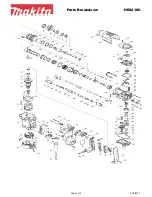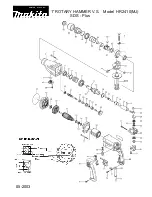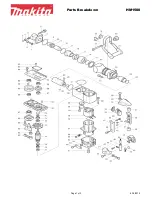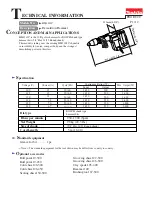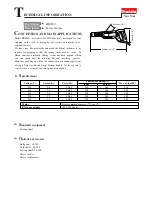
10 - English
OPERATION
Loosen the lock lever.
Turn the depth adjustment knob counterclockwise to
increase the depth of cut or clockwise to decrease the
depth of cut.
NOTE:
It should not be possible to make depth adjust-
ments with the lock lever tightened. If depth adjustments
are possible with the lock lever tightened, an adjustment
to the lock lever needs to be made. See
Adjustments.
When the desired depth of cut is set, tighten the lock
lever.
NOTE:
To adjust the depth of cut when the router is mounted
to a router table, loosen the lock lever, turn the depth adjust-
ment knob until the bit reaches the desired depth of cut, and
retighten the lock lever.
When the router is mounted to a router table, depth adjust-
ments can be made easily by using the supplied T-handle
wrench.
To make through table adjustments:
Unplug the router.
Loosen the lock lever.
Insert the T-handle wrench through the hole in the router
table into the hole on the subbase, and place the end of
the wrench socket over the adjusting nut.
Turn the wrench counterclockwise to decrease the depth
of cut or clockwise to increase the depth of cut.
NOTE:
It should not be possible to make depth adjust-
ments with the lock lever tightened. If depth adjustments
are possible with the lock lever tightened, an adjustment
to the lock lever needs to be made. See
Adjustments.
When the desired depth of cut is set, tighten the lock
lever.
wARNINg:
Do not use with router tables that fail to conform
to safe woodworking practices and offer proper
guarding for the bit. Use router tables that are UL
classified and identified suitable for use with the
specific router model. Failure to comply can result
in an accident causing possible injury.
wARNINg:
Only use router tables with proper guarding
for the bit and with on-board switch controlled
receptacles. Failure to use router tables with
appropriate safety features could result in serious
personal injury.
SETTINg DEPTH OF CUT FOR PLUNgE bASE
ROUTINg
See Figures 8 - 9, pages 19 - 20.
The bit depth can be adjusted on the plunge base with a two
way system. The depth stop bar, located on the side of the
router, measures bit depth in 1/32 in. and should be used
when making large adjustments to the cutting depth. The
plunge depth stop knob, located on the base of the router,
measures depth cuts in 1/64 in. and should be used when
making small adjustments to the cutting depth.
The plunge depth stop knob and the depth stop bar make
it possible to make repetitive cuts in successive passes. A
preset cutting depth is achieved by plunging the router until
the depth stop bar comes in contact with the plunge depth
stop knob.
Before setting your desired depth of cut, use the depth stop
bar and plunge depth stop knob to establish the “zero point”
of the workpiece.
NOTE:
The zero point is normally the top surface of the
workpiece.
To establish the zero point:
Unplug the router.
Install the bit you intend to use for cutting.
Place the plunge base on a flat surface or on the
workpiece.
Loosen the locking arm to allow the unit to return to it’s
full upward position.
Turn the plunge depth stop knob counterclockwise until
the scale on the front of the stop reads 1/4 in.
Loosen the depth stop bar lock knob and allow the depth
stop bar to drop down and contact the top of the plunge
depth stop knob.
NOTE:
If the bar does not drop down, it may be necessary
to move the slide to a higher position to allow the bar to
move freely.
Slowly plunge the router until the bit contacts the work
surface. This will provide a “zero” depth of cut reference
point.
Lock the locking arm to hold the bit at “zero” depth.
Tighten the depth stop bar lock knob. Move the depth
indicator slide to align the edge with the “0” indicator on
the scale.


























